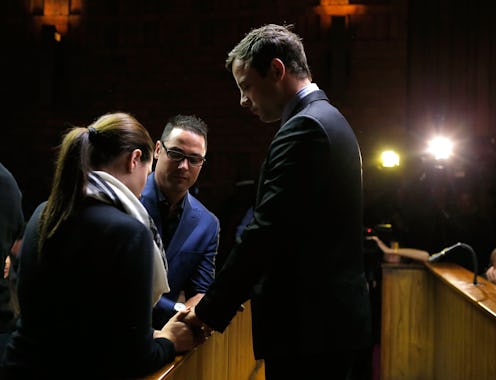News
Oscar Pistorius' Trial Is About To Resume
After more than a month's delay, the murder trial of Oscar Pistorius will resume Monday, bringing the legal fate of the ex-Olympic sprinter back into the public eye. He hasn't appeared before the court since May 26, following a request by chief prosecutor Gerrie Nel that he be submitted for mandatory psychiatric evaluation, which was granted by Judge Thokozile Masipa. Nel called for the evaluation following a defense witness' claim that Pistorius suffered from "generalized anxiety disorder." Such a diagnosis would bolster Pistorius' claim of innocence.
Throughout the last month, Pistorius has been evaluated by a four-member panel of mental health specialists on an outpatient basis, at Weskoppies Psychiatric Hospital in Pretoria, South Africa. And in the last four weeks, news of the already lengthy trial — longer by far than it was initially projected to take, having begun on March 6, and been interrupted on two occasions — has faded, awaiting the return of Pistorius to the courtroom. The time off makes it all the easier to forget just where the trial stands, how it arrived there, and where it's likely to go.
Here are four things to keep in mind as this trial gets back underway...
1. Did An Anxiety Disorder Contribute To The Death Of Reeva Steenkamp?
Whether Pistorius murdered then-girlfriend Reeva Steenkamp is a question for Judge Thokozile Masipa to answer — there's no jury in this trial, only the verdict issued from the bench. But that Pistorius killed her is not in dispute. In the early-morning hours of February 14, 2013 (yes, Valentine's Day) Pistorius opened fire at his bathroom door. He claims that he mistook Steenkamp for a home intruder, and fatally shot her because he feared for his own safety.
This is why Pistorius' defense team presented testimony that he suffered from an anxiety disorder. An official diagnosis would back the idea that he acted in a state of fear for his life. Whether those fears were reasonably founded or not, this could allow Pistorius to escape the worst possible outcome of the trial: a life sentence.
Prosecutor Nel isn't buying it, however — he's tried to portray Pistorius as a hotheaded boyfriend who likely murdered Steenkamp in the course of some sort of quarrel. He cited the presence of Steenkamp's jeans outside an otherwise packed bag as an indication the pair had been awake, not sleeping, when the incident took place. He also highlighted discrepancies between Pistorius' descriptions of events on his bail application as compared to his in-court version.
2. Oscar Pistorius' Approach To Guns
Throughout the course of the trial, Pistorius has been described by witnesses both as someone prone to paranoia about his personal security, and someone with a history of reckless behavior involving guns.
In one such testimony, professional boxer Kevin Lerena stated that Pistorius had once accidentally fired a gun directly into the ground while dining at a restaurant with friends, and immediately began convincing a friend to take the blame for it. In another, Pistorius' ex-girlfriend Samantha Taylor described him angrily firing a shot out of his sunroof after being pulled over by a traffic cop, and once using the gun to threaten another driver he believed was following him.
In a way, Taylor's claims cut both ways. She did attest to Pistorius' constantly-armed state, which lends credence to the idea he was prone to feeling threatened. But her testimony and Lerena's — especially the allegation that Pistorius immediately acted to cover up his role in firing an accidental shot — didn't paint him in a positive light.
3. What The Psychiatric Evaluation Could Mean
If he's convicted for the murder charge he's facing now, Pistorius would receive a life sentence in prison, though that isn't as iron-clad as it sounds — now just 29, he'd at least be eligible for a parole hearing in 25 years.
But that's not the only negative outcome for Pistorius, just the worst one. The decision to lock Pistorius up or set him free is entirely up to Judge Masipa, and she can also decide to convict him of a lesser charge, likely culpable homicide. It's comparable to a charge of manslaughter in the United States, and could land him a 15 year sentence.
Or, of course, Masipa could find him entirely innocent of the charges, and he'd be a free man. This could happen if Pistorius returns from his psych evaluation with a diagnosis backing up that of his defense witness — that he suffers from generalized anxiety, and was mentally incapacitated at the time of the shooting.
4. How Much Trial is Left Before the Verdict?
When the trial was most recently suspended, there were just three defense witnesses thought to be left. But that doesn't mean it's ending soon. Far from it, in fact — after the defense closes its case, the trial is again due to postpone for a third time, according to the Daily Maverick , to allow the two sides to prepare their closing statements.
They report that this process could take as long as a whole month. In other words, as quickly as the trial will resume, it'll be due for a halt again, and it could take until early August before Judge Masipa rules on Pistorius' fate.
Image: Sky News
